

“WE JUST HAVE TO GET THEM GROWING THEIR OWN FOOD” THE CULTURAL POLITICS OF COMMUNITY GARDENS. University of Canterbury. Food and Agriculture Organization of the United Nations. In 2011, FAO presented the estimate that around 1/3 of the world’s food was lost or wasted every year.
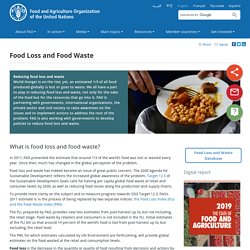
Since then, much has changed in the global perception of the problem. Food loss and waste has indeed become an issue of great public concern. The 2030 Agenda for Sustainable Development reflects the increased global awareness of the problem. Target 12.3 of the Sustainable Development Goals calls for halving per capita global food waste at retail and consumer levels by 2030, as well as reducing food losses along the production and supply chains.
To provide more clarity on the subject and to measure progress towards SDG Target 12.3, FAO’s 2011 estimate is in the process of being replaced by two separate indices: the Food Loss Index (FLI) and the Food Waste Index (FWI). The FLI, prepared by FAO, provides new loss estimates from post-harvest up to, but not including, the retail stage. Home - Sustainable Food Trust - Sustainable Food Trust. Food resilience : Christchurch City Council. Christchurch aims to be the best edible garden city in the world, where all people have access to healthy, affordable and locally grown food to support healthy and active lifestyles.
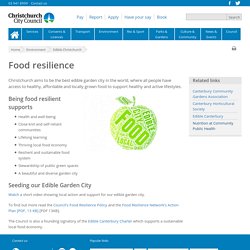
Being food resilient supports Health and well-beingClose knit and self-reliant communitiesLifelong learningThriving local food economyResilient and sustainable food systemStewardship of public green spacesA beautiful and diverse garden city Seeding our Edible Garden City Watch(external link) a short video showing local action and support for our edible garden city. To find out more read the Council’s Food Resilience Policy and the Food Resilience Network’s Action Plan [PDF, 13 KB] [PDF 13KB]. The Council is also a founding signatory of the Edible Canterbury Charter(external link) which supports a sustainable local food economy.
Food waste stats in NZ. Food Waste. Time For A Change. For many years while Tom travelled he stayed in the best hotels and ate plenty of fancy food.
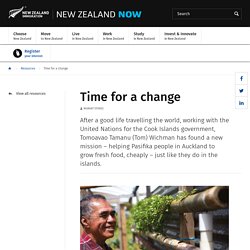
His weight crept up, his health deteriorated, and then he developed diabetes, and finally cancer. As a result Tom changed his diet. WHAKATANE Community Garden New Zealand. Designing a Lifestyle, Not Just a Garden - The Permaculture Research Institute. Food eco-footprint. Just Zilch. Sustainable food security. Below are links to the innovators featured in the Solutions Agenda and other resources related to the eight sustainable development innovations we discussed by the research team.
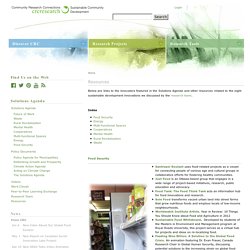
Food Systems. Learn About.
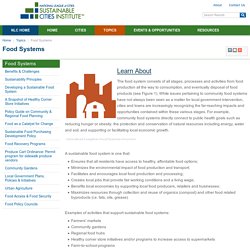
Podcast: Community - Gardens. New Brighton Community Gardens. Sustainable Food Basics. Do you want to do something positive to help promote sustainable food, save family farms, and let others know about the problems and solutions with our food supply?
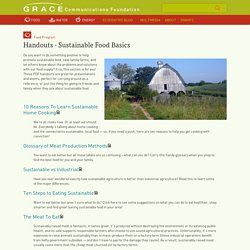
If so, this section is for you! These PDF handouts are great for presentations and events, perfect for carrying around as a reference, or just the thing for giving to friends and family when they ask about sustainable food. 10 Reasons To Learn Sustainable Home Cooking We're all cooks now. Or at least we should be. Glossary of Meat Production Methods You want to eat better but all those labels are so confusing – what can you do? Sustainable vs Industrial Have you ever wondered exactly how sustainable agriculture is better than industrial agriculture? Green urbanism - Wikipedia. Green urbanism has been defined as the practice of creating communities[1] beneficial to human and the environment.
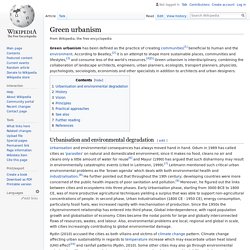
According to Beatley,[2] it is an attempt to shape more sustainable places, communities and lifestyles,[3] and consume less of the world’s resources.[4][5] Green urbanism is interdisciplinary, combining the collaboration of landscape architects, engineers, urban planners, ecologists, transport planners, physicists, psychologists, sociologists, economists and other specialists in addition to architects and urban designers. Urbanisation and environmental degradation[edit] Urbanisation and environmental consequences has always moved hand in hand. Rydin (2010) accused the cities as both villains and victims of climate change pattern. Climate change affecting urban sustainability in regards to temperature increase which may exacerbate urban heat island (UHI) effect[10] and rainfall patterns (Rydin, 2010). History[edit] Going Zero Waste: 6 Reasons Canning is Part of a Sustainable Lifestyle.
Canning reduces both food and packaging waste.
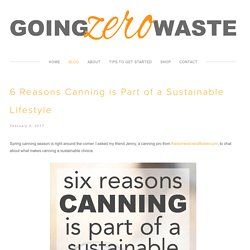
It gives you control over your diet. It frees you from reliance on commercially produced foods, and it is far more delicious than anything you could buy in a store. sustainably eat out of season: Canning preserves food to be enjoyed when it's out of season. Typically, eating out of season involves food grown many, many miles away, even in another hemisphere which isn't very sustainable.
Eating tomatoes in the winter or citrus in the summer is not in line with the natural growing season here. Related: 15 ways to save money on real food tools that are meant to be reused: Mason jars are made from sturdy glass. Mason jars are either regular mouthed or wide mouthed. It bears mentioning that jars are infinitely useful beyond canning. Related: 13 unexpected uses for a mason jar. developing a healthy relationship with food: Canning teaches you to save fresh produce for later.
Many informed, conscious people have no idea what produce is in-season. Path to Sustainability is Preserving Fresh Food.